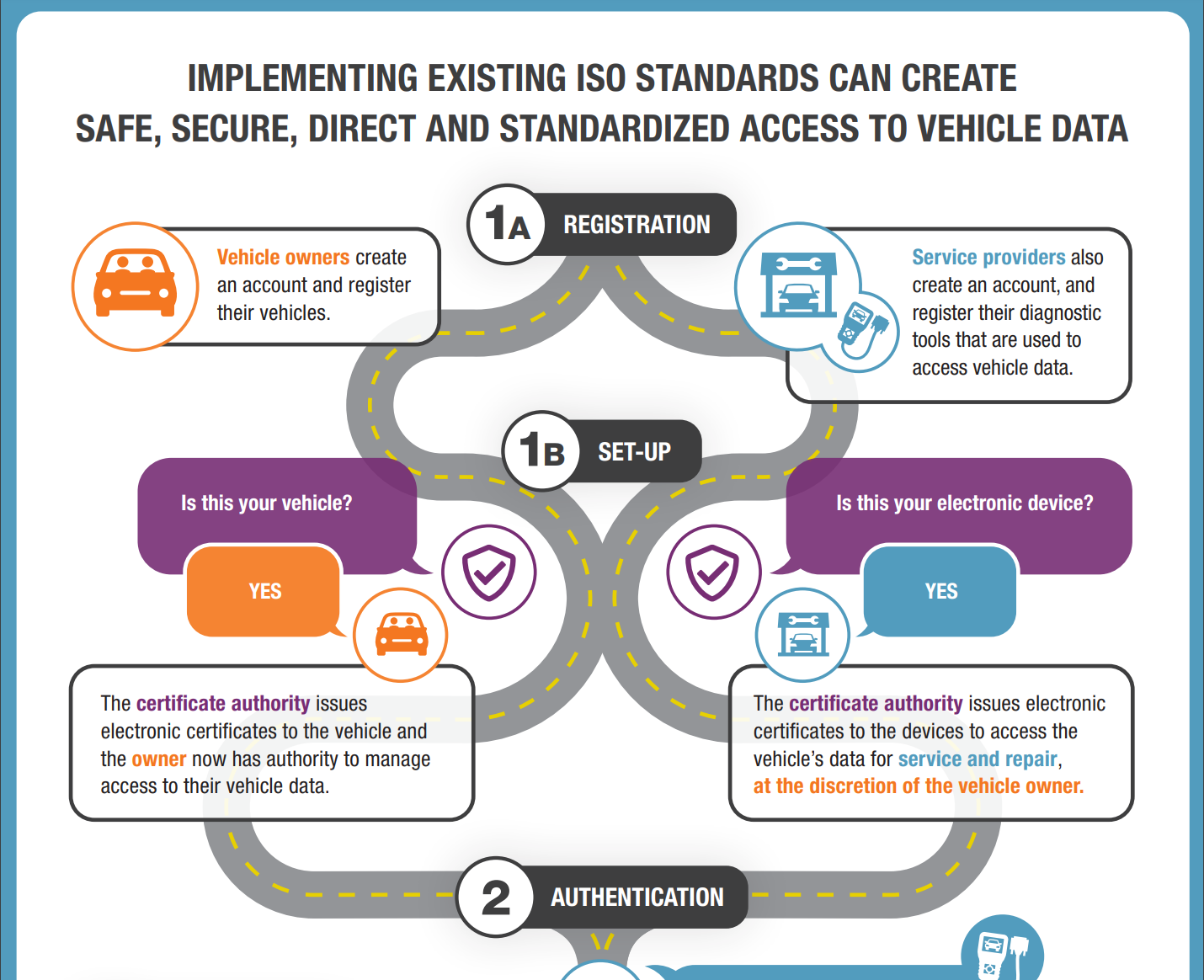
National Right to Repair
The Issue
Direct access to vehicle data is under threat by vehicle manufacturers. Historically, OBD-2 ports have granted vehicle owners and technicians access to vehicle data to assist with maintenance and repair.
However, in the digital age of the modern car, vehicle data is now transmitted wirelessly and sent directly only to vehicle manufacturers.
In 2021, 50% of cars already have these connected capabilities and by 2030, about 95% of new vehicles sold globally will have this connectivity (McKinsey).
Testimonial | Kathleen Callahan, Xpertech Auto Repair
This is a detriment to consumers, which could result in:
- Increased cost to the consumer
- Limited consumer choice in where they take their vehicle for maintenance and repair
- Impact to consumer safety and security with unstandardized data
- Lack of privacy: drivers unwittingly generate new revenue streams for vehicle manufacturers every time they get behind the wheel.
For the aftermarket, this can result in:
- Loss of innovation
- Lack of competition
- Reduced collaboration
Wireless transmission of data, also known as telematics, allows vehicles to be diagnosed and in some cases, repaired without ever going to a shop. While access to this data could provide many benefits to car owners, currently the data is sent only to the vehicle manufacturer who then serves as gatekeeper for the data, determining who can have access and at what cost.
50%
of cars have these connected capabilities in 2021
95%
of new vehicles sold globally will have this connectivity by 2030
Testimonial | Dwayne Myers, Dynamic Automotive
Our Position
We believe drivers should have the right to transparency around the data collected from their vehicles, including what was collected, how it was used and with whom the vehicle manufacturers shared it. Further, it should be the consumer’s choice who is able to access data needed to maintain and repair their vehicles.
This issue is so critical that Auto Care Association, MEMA Aftermarket Suppliers and CAR Coalition have worked together on behalf of their members to introduce The REPAIR (Right to Equitable and Professional Auto Industry Repair) Act.
The REPAIR Act would preserve consumer access to high quality and affordable vehicle repair by ensuring that as vehicles continue to modernize, vehicle owners and their repairer of choice have equal access to repair and maintenance tools and data. The REPAIR Act has four important principles:
- Prevents vehicle manufacturers from employing barriers to repair and maintenance
- Required vehicle owners and their designees get direct access to vehicle generated data
- Prohibits mandating particular brands, tools and equipment
- Establishes a stakeholder advisory committee to examine emerging barriers to repair and maintenance.
Read a full summary of the REPAIR Act.
America’s vibrant network of local, independent repair shops plays a critical role in ensuring car and truck owners have options when it comes to repairing their vehicles.
Hear why independent repair shops are calling on Congress to pass the bipartisan REPAIR Act (H.R. 906).
the secure solution
Not surprisingly, vehicle manufactures are not acknowledging that a globally recognized technical design framework for Intelligent Transportation Systems (ITS) could enable solutions consumers can use to directly access their vehicle data, as well as direct the data to the service provider of their choice.
These solutions are based on standards which provide security, privacy, choice and safety, leveling the playing field through secure and standardized data access.
Implementing industry standards enables safe, secure, standardized and direct access to vehicle data which can be directed to the repair facilities of the consumers choosing. Implementing standards also support the creation of fair and equitable policies that ensure safety, security, competition and innovation in the automotive aftermarket.
Download the infographic to learn more about the steps to implement safe and secure vehicle data access
Whitepapers
Read the Secure Vehicle Interface Whitepaper and SVI_Technical_Paper_ExEnd 2018-09-05 MRT 0.5
What’s happening now
In Nov 2020, Massachusetts voters overwhelmingly voiced their support for Ballot Question 1, also known as Right to Repair with a 75% vote yes. In Nov 2023, Maine followed suit with an 84% vote yes. However, the fight for federal legislation to secure our rights across the United States has just begun to protect the 273,000 shops and 900,000 technicians that service the 293 million vehicles on the road.
If manufacturers are permitted to control access to data, they will have the ability to determine who can repair their vehicles and at what cost. Such action would give manufacturers almost total control of the independent repair market, limiting consumer choice and increasing cost and inconvenience by bestowing the car company with almost total power over the aftermarket.
The time to act is now – tell your legislator to support The REPAIR Act.
273,000 shops
and
900,000 technicians
who service
293 million vehicles
on U.S. roads
Take Action Today
Current law is inadequate to address growing competitive concerns created by new technology, and the Act would seek to resolve current and future issues that prevent consumers and independent repair shops from being able to fully maintain and repair modern vehicles, while ensuring cybersecurity and safety for critical vehicle systems.
The REPAIR Act would preserve consumer access to high quality and affordable vehicle repair by ensuring that as vehicles continue to modernize, vehicle owners and their repairer of choice have equal access to repair and maintenance tools and data. As vehicles continue to become more advanced, vehicle repair and maintenance requires access to data, software, sophisticated replacement components, training, and diagnostic tools.
Tell your legislator to support Right to Repair legislation for the auto industry today!
Use our media kit to download and share or create your own graphics supporting the cause.
Encourage your company to also take action by sending a letter to their legislator.
Shops: tell us if you were restricted from repairing a vehicle.










